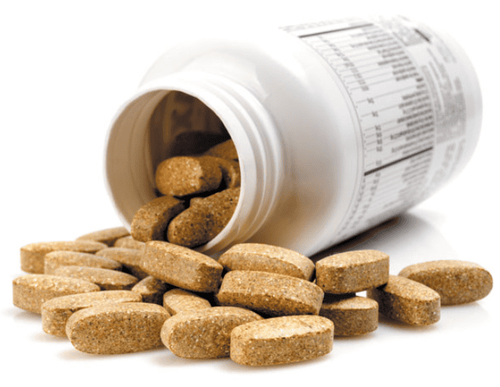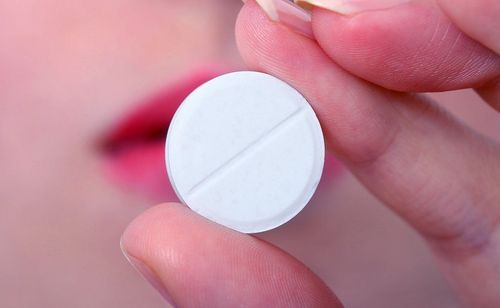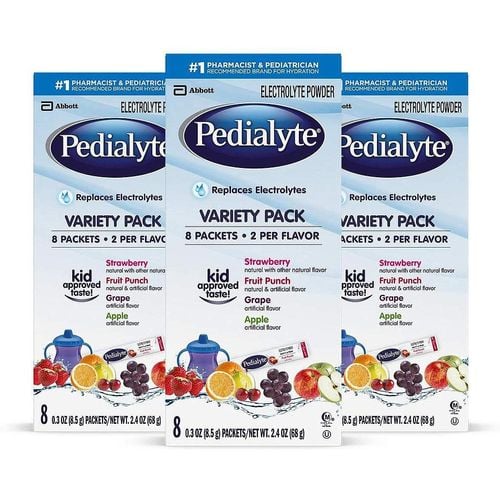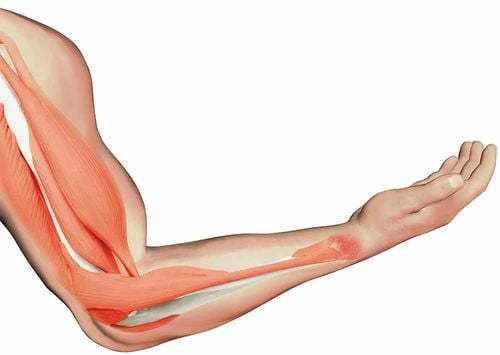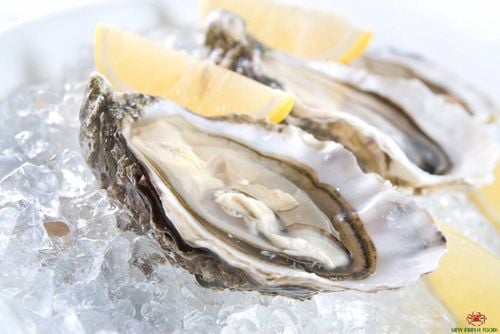This is an automatically translated article.
Oysters are a dish found in many parts of the world. Whether you like oysters or not, you should know the health benefits hidden behind the raw shell of oysters, and then decide whether to use it or not.
1. What kind of animal are oysters?
Oysters are saltwater bivalve molluscs that live in marine habitats such as bays and oceans.
They are an important part of the ecosystem, filtering pollutants out of the water and providing habitat for other species, such as gibbons and mussels. There are many different types of oysters whose aromatic, flavorful flesh is considered a delicacy around the world.
Despite their reputation for their purported aphrodisiac qualities, these mollusks have numerous health benefits.
2. Nutritional composition of oysters
Oysters have a hard, irregularly shaped shell that protects the plump, gray inner body. This inner body known as meat is very nutritious.
In fact, oyster nutrition with a 100-gram oyster provides the following nutrients: calories 68, protein 7 grams, fat 3 grams, Vitamin D, Thiamine (vitamin B1), Niacin, Vitamin B12, Iron , Magnesium, Phosphorus, Zinc, Copper, Manganese, Selenium.
Oysters are low in calories but still packed with nutrients, including protein, healthy fats, vitamins and minerals.
For example, a 100 gram serving provides vitamins B12, zinc and copper and more than 75% of your daily needs for selenium and vitamin D.
These delicious mollusks are also a good source of omega fatty acids- 3 well, a family of polyunsaturated fats that play an important role in your body.
People who eat a diet high in omega-3 fats have a lower risk of conditions like heart disease and type 2 diabetes.
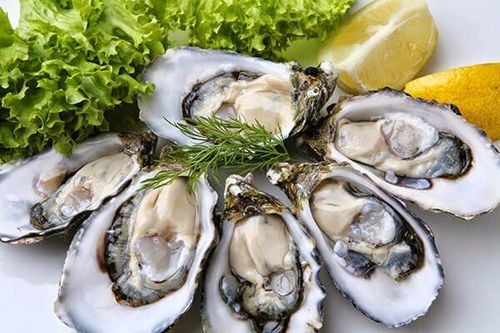
Hàu có lượng calo thấp nhưng vẫn chứa đầy chất dinh dưỡng
3. Some important nutrients found in oysters
3.1. Vitamins and Minerals
- Vitamin B12: This nutrient is important for maintaining the nervous system, metabolism, and blood cell formation. Many people, especially the elderly, are deficient in this vitamin.
- Zinc: This mineral plays an important role in immune system health, supplementing with zinc helps metabolism and cell growth. A 3.5-ounce (100-gram) oyster provides more than 600% of the RDI.
- Selenium: This mineral maintains proper thyroid function and metabolism. It also acts as a powerful antioxidant, helping to prevent damage to cells caused by free radicals.
- Vitamin D : Vitamin D is essential for immune health, cell growth and bone health. Many people are deficient in this vitamin, especially those who live in colder climates.
- Furthermore, zinc and vitamins B12 and D also have antioxidant effects, increasing the protective benefits of oysters even higher. Research shows that people who eat a diet rich in antioxidants have a reduced risk of heart disease, diabetes, certain cancers, and all-cause mortality.
3.2. High Quality Protein Source
Oysters are an excellent source of high quality protein with 100 grams featuring 7 grams of this filling nutrient. They are also a complete source of protein, which means they contain all nine essential amino acids your body needs. Adding a source of protein to meals and snacks can help promote feelings of fullness and encourage weight loss.
Protein-rich foods help stabilize hunger by increasing levels of adequate hormones such as peptides and cholecystokinin.
High-protein diets have been shown to be effective in promoting weight loss and leading to more weight loss than low-fat or high-carb diets.
Following a high-protein diet may also be beneficial for blood sugar control, especially in people with diabetes. For example, one review of research demonstrated that a high-protein diet significantly reduced levels of hemoglobin A1c - a marker of long-term blood sugar control in adults with type 2 diabetes. More , a high-protein diet may reduce heart disease risk factors in people with type 2 diabetes.
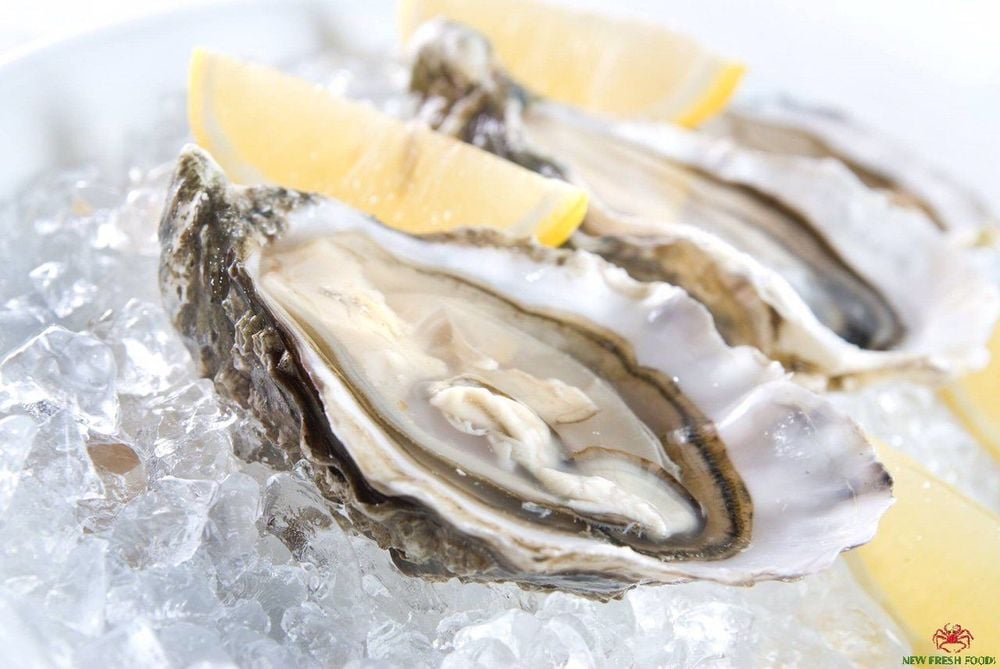
Hàu là một nguồn protein chất lượng cao tuyệt vời
3.3. Contains antioxidants
Besides beneficial nutrients such as vitamins, minerals, proteins. Oysters also contain a unique recently discovered antioxidant called 3,5-Dihydroxy-4-methoxybenzyl alcohol (DHMBA).
DHMBA is a phenolic compound that exhibits powerful antioxidant effects.
In fact, one study found that it was 15 times more powerful at fighting oxidative stress than Trolox, a synthetic form of vitamin E commonly used to prevent damage from oxidative stress. Several test-tube studies indicate that DHMBA from oysters may be particularly beneficial for liver health.
For example, one test-tube study demonstrated that it protected human liver cells from damage and cell death caused by oxidative stress.
DHMBA reduces the oxidation of LDL (bad) cholesterol. Cholesterol oxidation is a chemical reaction linked to atherosclerosis (the buildup of plaque in your arteries), a major risk factor for heart disease.
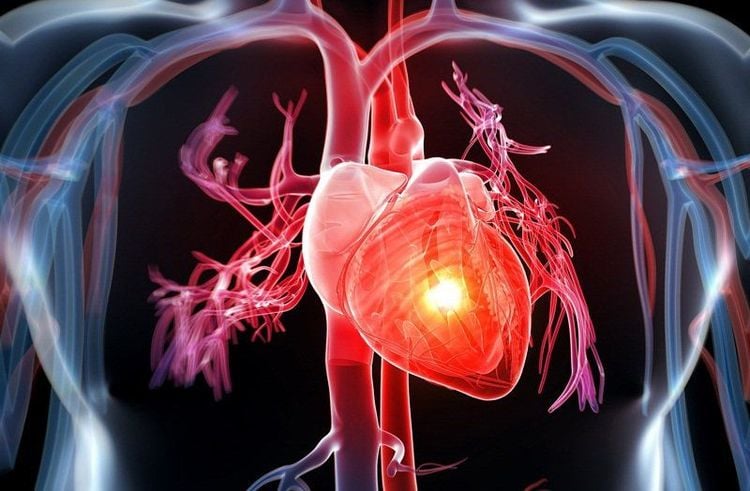
Hàu có tác dụng tốt tới sức khỏe tim mạch
4. Benefits of oyster milk
Today oysters are very valuable marine animals. So is it good to eat oysters? Here are 10 benefits of oysters:
1. Boosts immunity Oysters are rich in vitamins E and C. They also contain various minerals that help strengthen the immune system. The anti-inflammatory and antioxidant properties of oysters also protect against free radicals that damage the body.
4.2. Good for heart health
Oysters have a good effect on heart health. They reduce plaque buildup in the artery lumen by inhibiting it from binding to artery walls and blood vessels. Furthermore, the high levels of magnesium and potassium in oysters help lower blood pressure and relax blood vessels. Vitamin E increases the flexibility and strength of cell membranes.
4.3. Good for Eyes
Oysters top the list of natural sources of zinc, a mineral that ensures that the eye's pigment is adequately produced in the retina.
4.4. Improves Brain Function
Oysters are a diverse source of B12, omega-3 fatty acids, zinc and iron, which are beneficial for brain function. Studies have shown that low iron levels in the brain impair a person's ability to concentrate, while zinc deficiency can affect memory.
4.5. Improves Mood
Due to the high concentration of zinc found in oysters, they are known to stabilize mood. Zinc is considered an essential mineral, as it is not stored in the body and needs to be consumed through the diet. A study published in the American Journal of Clinical Nutrition found that increased blood zinc levels in children were associated with reduced anxiety and reduced depression.
4.6. Good for Skin
The mineral zinc plays a big role in skin care by helping to create and promote collagen. Collagen is vital for supporting skin structure and reducing sagging. It also helps maintain stronger nails, and keeps the scalp and hair healthy.
4.7. Vascular system health
One serving of oysters contains 16-18% of the daily requirement of vitamin C. Vitamin C helps fight cardiovascular disease by activating coenzymes the body needs to make norepinephrine. They are also high in omega-3 fatty acids, potassium, and magnesium and are known to reduce the risk of heart attack and stroke, and are also effective in lowering blood pressure.
4.8. Boosts Energy
Oysters contain a good amount of vitamin B12, which boosts energy and turns the food we eat into energy. Oysters also contain iron, which helps transport oxygen to body cells for energy.
4.9. Good for Bone Health
The presence of selenium, copper, iron, zinc, phosphorus and calcium found in mollusks leads to stronger bone health and density.
4.10. Good for sexual health
Zinc is found in oysters, which is why they are considered an old age aphrodisiac. Zinc helps the body produce testosterone, a hormone important in regulating women's and men's libido and sexual function. In men, research shows that this mineral improves sperm count and swimming ability. In women, zinc may help the ovaries, and thus help balance and regulate the combination of estrogen, progesterone, and testosterone.
Please dial HOTLINE for more information or register for an appointment HERE. Download MyVinmec app to make appointments faster and to manage your bookings easily.




